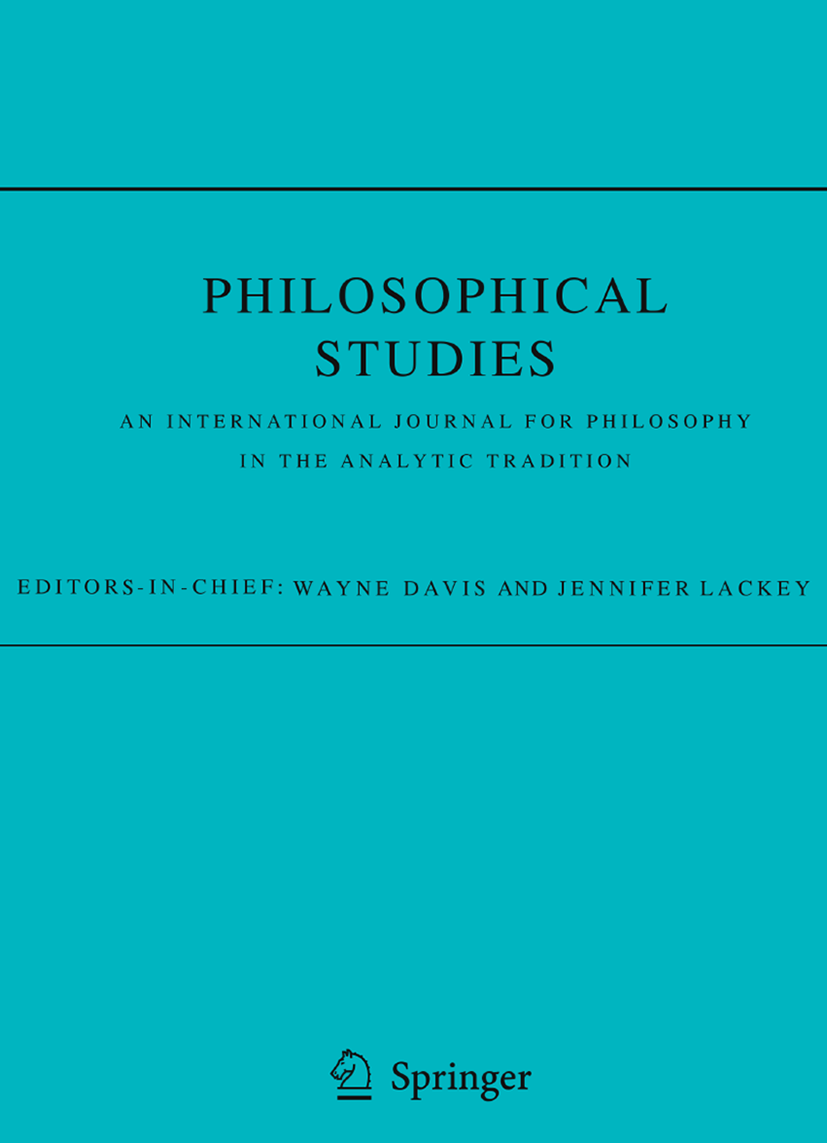link.springer.com/article/10.1007/s11098-017-0917-2
Preview meta tags from the link.springer.com website.
Linked Hostnames
21- 54 links tolink.springer.com
- 20 links toscholar.google.com
- 14 links todoi.org
- 10 links towww.springernature.com
- 2 links tocitation-needed.springer.com
- 2 links tosupport.springernature.com
- 1 link toauthorservices.springernature.com
- 1 link tocrossmark.crossref.org
Thumbnail

Search Engine Appearance
https://link.springer.com/article/10.1007/s11098-017-0917-2
How wishful seeing is not like wishful thinking - Philosophical Studies
On a traditional view of perceptual justification, perceptual experiences always provide prima facie justification for beliefs based on them. Against this
Bing
How wishful seeing is not like wishful thinking - Philosophical Studies
https://link.springer.com/article/10.1007/s11098-017-0917-2
On a traditional view of perceptual justification, perceptual experiences always provide prima facie justification for beliefs based on them. Against this
DuckDuckGo
How wishful seeing is not like wishful thinking - Philosophical Studies
On a traditional view of perceptual justification, perceptual experiences always provide prima facie justification for beliefs based on them. Against this
General Meta Tags
95- titleHow wishful seeing is not like wishful thinking | Philosophical Studies
- charsetUTF-8
- X-UA-CompatibleIE=edge
- applicable-devicepc,mobile
- viewportwidth=device-width, initial-scale=1
Open Graph Meta Tags
6- og:urlhttps://link.springer.com/article/10.1007/s11098-017-0917-2
- og:typearticle
- og:site_nameSpringerLink
- og:titleHow wishful seeing is not like wishful thinking - Philosophical Studies
- og:descriptionOn a traditional view of perceptual justification, perceptual experiences always provide prima facie justification for beliefs based on them. Against this view, Matthew McGrath and Susanna Siegel argue that if an experience is formed in an epistemically pernicious way then it is epistemically downgraded. They argue that "wishful seeing"—when a subject sees something because he wants to see it—is psychologically and normatively analogous to wishful thinking. They conclude that perception can lose its traditional justificatory power, and that our epistemic norms should govern how experiences are formed. To make this case, the downgrader must first isolate a feature of wishful thinking that makes it epistemically defective, then show that this feature is present in wishful seeing. I present a dilemma for the downgrader. There are two features of wishful thinking that could plausibly explain why it is irrational: the fact that a desire causes you to form a belief not supported by adequate evidence, or the mere influence that desire holds over belief formation. Each option presents formidable difficulties. Although the first “bad evidence” explanation, which McGrath employs, explains the irrationality of wishful thinking, it does not transfer to wishful seeing, since experiences are not formed in response to evidence. The second “influence of desire” explanation, which Siegel employs, fails to isolate an epistemically defective feature of wishful thinking, and also does not transfer to wishful seeing. I conclude that the downgrader’s argument from wishful seeing fails.
Twitter Meta Tags
6- twitter:site@SpringerLink
- twitter:cardsummary_large_image
- twitter:image:altContent cover image
- twitter:titleHow wishful seeing is not like wishful thinking
- twitter:descriptionPhilosophical Studies - On a traditional view of perceptual justification, perceptual experiences always provide prima facie justification for beliefs based on them. Against this view, Matthew...
Item Prop Meta Tags
3- position1
- position2
- position3
Link Tags
9- apple-touch-icon/oscar-static/img/favicons/darwin/apple-touch-icon-6ef0829b9c.png
- canonicalhttps://link.springer.com/article/10.1007/s11098-017-0917-2
- icon/oscar-static/img/favicons/darwin/android-chrome-192x192.png
- icon/oscar-static/img/favicons/darwin/favicon-32x32.png
- icon/oscar-static/img/favicons/darwin/favicon-16x16.png
Emails
1Links
117- http://scholar.google.com/scholar_lookup?&title=Alternate%20possibilities%20and%20moral%20responsibility&journal=The%20Journal%20of%20Philosophy&doi=10.2307%2F2023833&volume=66&issue=23&pages=829-839&publication_year=1969&author=Frankfurt%2CHG
- http://scholar.google.com/scholar_lookup?&title=Categorical%20sensitivity%20to%20color%20differences&journal=Journal%20of%20Vision&doi=10.1167%2F13.7.1&volume=13&issue=7&publication_year=2013&author=Witzel%2CC&author=Gegenfurtner%2CKR
- http://scholar.google.com/scholar_lookup?&title=Cognitive%20penetrability%20and%20perceptual%20justification&journal=Nous&doi=10.1111%2Fj.1468-0068.2010.00786.x&volume=46&issue=2&pages=201-222&publication_year=2012&author=Siegel%2CS
- http://scholar.google.com/scholar_lookup?&title=Cognitive%20penetration%20of%20colour%20experience%3A%20Rethinking%20the%20issue%20in%20light%20of%20an%20indirect%20mechanism&journal=Philosophy%20and%20Phenomenological%20Research&doi=10.1111%2Fj.1933-1592.2010.00481.x&volume=84&issue=1&pages=24-62&publication_year=2012&author=Macpherson%2CF
- http://scholar.google.com/scholar_lookup?&title=Color%20appearance%20of%20familiar%20objects%3A%20Effects%20of%20object%20shape%2C%20texture%2C%20and%20illumination%20changes&journal=Journal%20of%20Vision&doi=10.1167%2F8.5.13&volume=8&issue=5&publication_year=2008&author=Olkkonen%2CM&author=Hansen%2CT&author=Gegenfurtner%2CKR